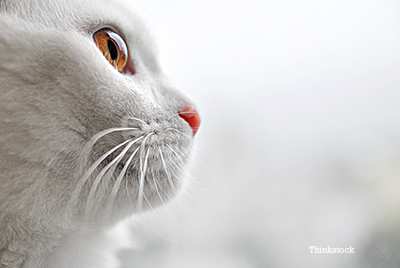
Although sudden onset blindness occurs in cats, it’s likely that most cases are simply sudden awareness by the owners of a progressive loss of vision. Since pets lead generally sheltered lives and don’t rely on reading the fine print of life, gradual loss of vision may be so unapparent to owners that only once it progresses to total blindness do they become aware. I have seen a few cats that, when presented for annual physical examination, shocked their guardians by being blind in one eye.  In fact, I have seen a few dogs and cats that were functionally blind but it had gone completely undetected. Much like with blind people, animals adapt well to their physical environment and once they are familiar with a room, they seem to navigate very well unless some item is moved.
In fact, I have seen a few dogs and cats that were functionally blind but it had gone completely undetected. Much like with blind people, animals adapt well to their physical environment and once they are familiar with a room, they seem to navigate very well unless some item is moved.
Symptoms of sudden blindness
If blindness develops very rapidly, however, then there is no chance for the cat to adapt. The ASPCA lists signs of sudden blindness to include:
- Disorientation
- Confusion
- Vocalization
- Bumping into or falling from familiar objects
Icatcare.org adds that in many cases the pupils will be widely dilated and non responsive.
Causes of sudden blindness
Causes of blindness range from injury and tumors to infections and loss of function of a part of the eye such as the retina or lens. Many are unavoidable and many are progressive but your awareness and understanding of the disorder is important, if a treatment or management plan is needed.
- Optic neuritis or inflammation of the optic nerve is relatively uncommon in cats but does occur and is associated with viral infections (feline infectious peritonitis), protozoal infections (toxoplasmosis), and fungal infections (cryptococcosis). The term “optic neuritis” compromises all diseases of the optic nerve that cause deterioration and usually produce a sudden visual field problem or total loss of vision in one or both eyes.
- High blood pressure (hypertension) is frequently associated with a loss of vision and is one of the more common causes of retinal detachment, according to the Veterinary Vision, INC. website. The elevated blood pressure causes damage to the blood vessels in the retina resulting in bleeding or fluid seepage. This can further lead to separation or detachment of the retina resulting in blindness.
- Retinal degeneration can also cause blindness and results in a loss of the light sensory cells in the retina. Though this is generally a slow and progressive disorder, the final stages of loss of vision can seem sudden.
- Diseases of the brain can result in secondary blindness due to an inability to process stimuli received from the eye. Conditions such as trauma, infections, inflammation and tumors are the primary underlying causes.
- Diseases of the lens such as cataracts and dislocated lenses are relatively uncommon and though they result in impaired vision they don’t necessarily mean the cat is blind.
Diagnosis of sudden blindness
Diagnosis begins by confirming your cat is actually blind. This requires some very simple tests and examinations. Disease is frequently detectable simply by examining the eyes with a light and a series of lenses (an ophthalmoscope).
Determining blood pressure is very important since hypertension is common in cats and is a common cause of retinal disease and blindness. Though blood pressure is easily measured in humans, measuring the pressure in the small blood vessels of a stressed cat can be very difficult.
Routine blood tests should always be run to check for concurrent or underlying diseases such as kidney disease.
Brain scans are needed if a primary brain disorder, such as a tumor, is suspected. Commonly available radiographs are of little value but veterinarians increasingly rely on CT and MRI evaluations.
Treatment of sudden blindness
In some cases the underlying cause of the blindness will be reversible and normal vision may return, but in many cases (even if the primary problem can be controlled) damage like retinal detachment is non reversible and blindness is permanent.
Living with a blind cat
One kitten I know of was blind from birth but with the help of another cat, who vocalized to attract the kitten, she functioned very happily in spite of her blindness. Now granted this kitten would not have survived long in an unsheltered surrounding.
Blindness or partial blindness is not uncommon in cats. Naturally, it necessitates a change in life experience, but it should not be considered a reason to put the cat down. Instead, protect your cat from danger and support her needs for enrichment. Your veterinarian will have more tips for raising a blind cat.
If you have any questions or concerns, you should always visit or call your veterinarian -- they are your best resource to ensure the health and well-being of your pets.
